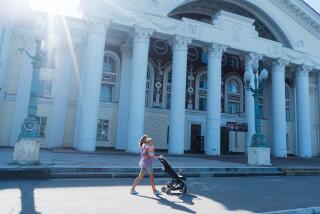Tolstoy’s Heirs in Battle for Control of Decaying Estate : Russia: Family wants to resurrect it as a monument. Officials see a source of prestige and, perhaps, income.
- Share via
YASNAYA POLYANA, Russia — It was the 83rd anniversary of Leo Tolstoy’s burial, and there was to be a memorial concert in the great hall of Tolstoy’s house on his vast ancestral estate.
Vladimir Tolstoy, 31, was escorting some visitors over the last bridge before entering the estate made famous in the works of his great-great-grandfather. This was the place, he recounted, that Leo Tolstoy had called his incarnation of all Russia, a place “without which I could not imagine Russia or my relationship to her.”
“And now look,” Vladimir said.
Spread before him was a view of a great valley, occupied almost in its entirety by an enormous chemical plant, giving the whole vista a carpet of whiskey-colored haze.
Leo Tolstoy’s view of his home as a microcosm of Russia and all its contradictions may never have been more apt than it is now. At Yasnaya Polyana, which means “Clear Glade,” pollution causes the leaves to fall from the trees every year three months early, in July.
This year, the estate’s apple orchards bore no fruit. During one particularly hot and humid summer a couple of years ago, many of the guides who escort visitors along its arbored walks came down with respiratory complaints.
But not only the ecology of this place, described so lovingly in Count Tolstoy’s novels and stories that many visitors find it familiar upon their very arrival, has become tainted.
Yasnaya Polyana has also become the center of a political and historical battle. This one is between the Tolstoy family, which is determined to regain administrative control of the estate to revive its status as a monument to their illustrious forebear, and the local Establishment, which sees Yasnaya Polyana as a source of prestige and, perhaps, income.
It is a battle between the spirituality of Russian tradition and the cold commercialism of the post-Communist state.
In the austere study of Yasnaya Polyana, Count Tolstoy wrote “War and Peace” and “Anna Karenina,” two of the greatest works of world literature; here he developed in late life a philosophy of Christianity so potent that it drew pilgrims from all over the world to his home--it still does--and provoked the Russian Orthodox Church to excommunicate him.
“This is a place where the morals shouldn’t be like they are in the rest of the country,” Vladimir said. “The renaissance of Russia has to start not in Moscow but in such localities as this, where old Russian traditions can be nurtured.”
More than a year ago, the Tolstoy family persuaded the ministry of culture to appoint Vladimir Tolstoy as the estate’s new director. He would be the first member of the family to head the institution in 37 years, or since Sophia Tolstaya-Yesenina, the writer’s daughter, died in 1956.
Vladimir resigned from the staff of a Moscow newspaper and prepared his family to make the 200-mile move to the south. But since then, he has been “sitting on my suitcases,” as he puts it, while the current administrators, aligned with the political administration of nearby Tula, refuse to vacate.
As it happens, Russian law leaves the museum under the joint jurisdiction of the local and national governments, so the result is a stalemate. The staff of 120 is split into pro- and anti-Tolstoy camps.
“No one is working over there, just fighting,” observed Lyudmila Noskova, a local journalist who has closely followed the affair.
Meanwhile, the current director, a local apparatchik named Andrei I. Tyapkin, has been accused in official documents of such infractions as building dachas , or country homes, for the use of local politicians on land within Yasnaya Polyana’s preservation zone, on which such construction is forbidden.
(Tyapkin says his signature on documents authorizing the construction is forged.)
He and other officers are also blamed for the general state of disrepair of a unique treasure of Russian culture; many buildings on the estate are in desperate need of renovation, and its gardens and glades need replanting.
“The main problem is how best and for the longest time to preserve Yasnaya Polyana as an agricultural complex,” said Vitaly B. Remizov, the deputy director. “There is a lot of natural deterioration--birch trees live an average of 150 years, for example, and ours were planted 130 years ago.”
Some observers also charge the local administration with what may be a uniquely Russian sin: inattention to Yasnaya Polyana’s soul.
“To have a Tolstoy back as director would mean having someone who feels for the spiritual meaning of this land,” said Nikolai P. Puzin, 83, who arrived here in the 1940s as a companion to Sergei Tolstoy, the writer’s aged eldest son, and stayed on as chief caretaker for about 50 years.
“The revival of Yasnaya Polyana can only be accomplished by the Tolstoys,” Noskova said. “If a Tolstoy were there, it would attract composers and writers to come and work in its peace and tranquillity. But the local authorities in Tula just don’t want to give away anything they have control of.”
Characteristically, national politics has also influenced the battle. In a recent interview with The Times, Culture Minister Yevgeny Y. Sidorov acknowledged that he had not tried to force the issue with Tula authorities for fear of antagonizing them when the Yeltsin government needs their support. Now that parliamentary elections are less than a month away, the prospect of resolving the issue to the Tolstoys’ satisfaction is even more remote.
Much of the family’s appeal for administrative control is based on tradition.
“It’s not for nothing that we are people of that place,” Vladimir Tolstoy said of his family, which now numbers more than 200 relatives scattered among six countries. “From childhood, I grew up in the atmosphere of Yasnaya Polyana.”
For their part, the current administrators argue that Vladimir is too green to take over control of a vast and complicated park and museum.
“There is such a great complex of problems here that any director needs a great deal of experience,” said Remizov, a Tolstoy scholar who is perhaps the most articulate anti-Vladimir Tolstoy adherent.
There is no question that Yasnaya Polyana is a cultural jewel that would be the envy of any civilized country. Consisting of 1,100 acres of woodland and rolling glade, it has at its core is a complex of houses built by the Volkonsky family, Count Tolstoy’s maternal forebears.
One house is now a museum in which Leo Tolstoy’s presence is almost palpable. His writing desk is left almost as it was on the day he left the estate for good in 1910, at the age of 82, to embark on a solitary journey on foot. (He turned up at a rail station more than 200 miles away, where he died.)
Leo Tolstoy’s own vision of his estate as a miniature of Russian society and history is reflected in the vagaries of its own management.
Yasnaya Polyana was effectively ceded to the Russian people by Sophia Andreevna Tolstaya, the writer’s widow, who so announced to Czar Nicholas II in 1917. Until her death two years later, she served as its first director and guide.
From 1919 to 1921 the preserve was in the hands of the Tolstoy Commune, an idealistic group that unsuccessfully experimented with utopian farming techniques based loosely on Leo Tolstoy’s own ideas.
Then Alexandra, Leo’s daughter, took over, armed with an order making Yasnaya Polyana a state museum. She built its hospital and school, run to this day according to Tolstoy’s own pedagogical principles. But her reign as director ended in 1929, after which Stalin’s secret police took over, seizing thousands of documents and deporting the estate’s workers and managers.
After the war, Sophia Tolstaya-Yesenina, another of the writer’s daughters, ran the museum from 1950 until her death in 1956.
Since then it has fallen unmistakably on hard times.
Some of that is the result of exterior forces. Five years ago, as many as 800 visitors a day used to come here to stroll the wooded promenades and tour the house. But now few can afford the $38 fare to reach here from Moscow, and the visitors are down to a trickle, affecting the museum’s income accordingly.
“Who can travel for such money?” Tyapkin asked at a recent meeting of Tolstoy aficionados.
“Without any doubt the preserve is in tragic condition,” Puzin said. “The preservation zone is built over, industrial pollution is unlimited, and relations with the work force, as they say, leave much to be desired.”
There is some basis for the supposition that the presence of a Tolstoy might well have averted some of this decline.
For one thing, the Tolstoy name exerts no little influence over this country and its people. It is said that when Lavrenti P. Beria, Stalin’s secret-police chief, once proposed deporting the family to Siberia, the dictator demurred with the words, “History would be outraged.”
Similarly, when the idea to build an industrial plant on the estate’s outskirts first surfaced in 1950, Tolstaya-Yesenina’s opposition single-handedly killed it; only when she died six years later did the plan go ahead.
Opened in 1965, the industrial facility produces nitrates, heavy metals and other noxious chemicals from a location directly downwind of the estate, according to Iulia K. Federova, head of ecological studies at Yasnaya Polyana.
Now there is little that the advent of a Tolstoy in the director’s chair could accomplish to overcome this; Noskova, the Tula journalist, notes that the economic situation in Russia makes closing such a plant with 5,000 employees virtually impossible.
But she and others do believe that Vladimir Tolstoy’s appointment might restore to Yasnaya Polyana the kind of serenity observed by Valentina Lebedeva, another long-term caretaker, when the writer Konstantin Paustovsky visited the place one day with his family.
“He was all alone with his wife, out in the open,” she recalled. “He was whispering to her, under the trees, as if at Yasnaya Polyana he was afraid of speaking loudly.”
More to Read
Sign up for The Wild
We’ll help you find the best places to hike, bike and run, as well as the perfect silent spots for meditation and yoga.
You may occasionally receive promotional content from the Los Angeles Times.






